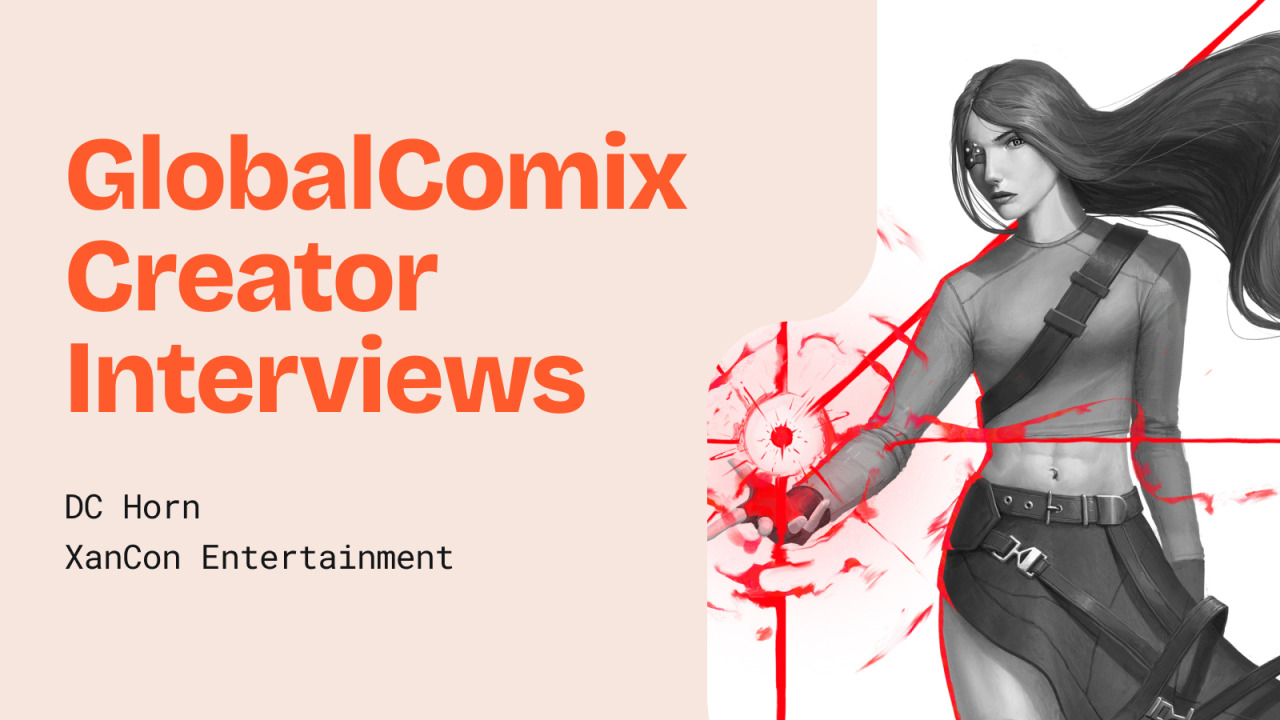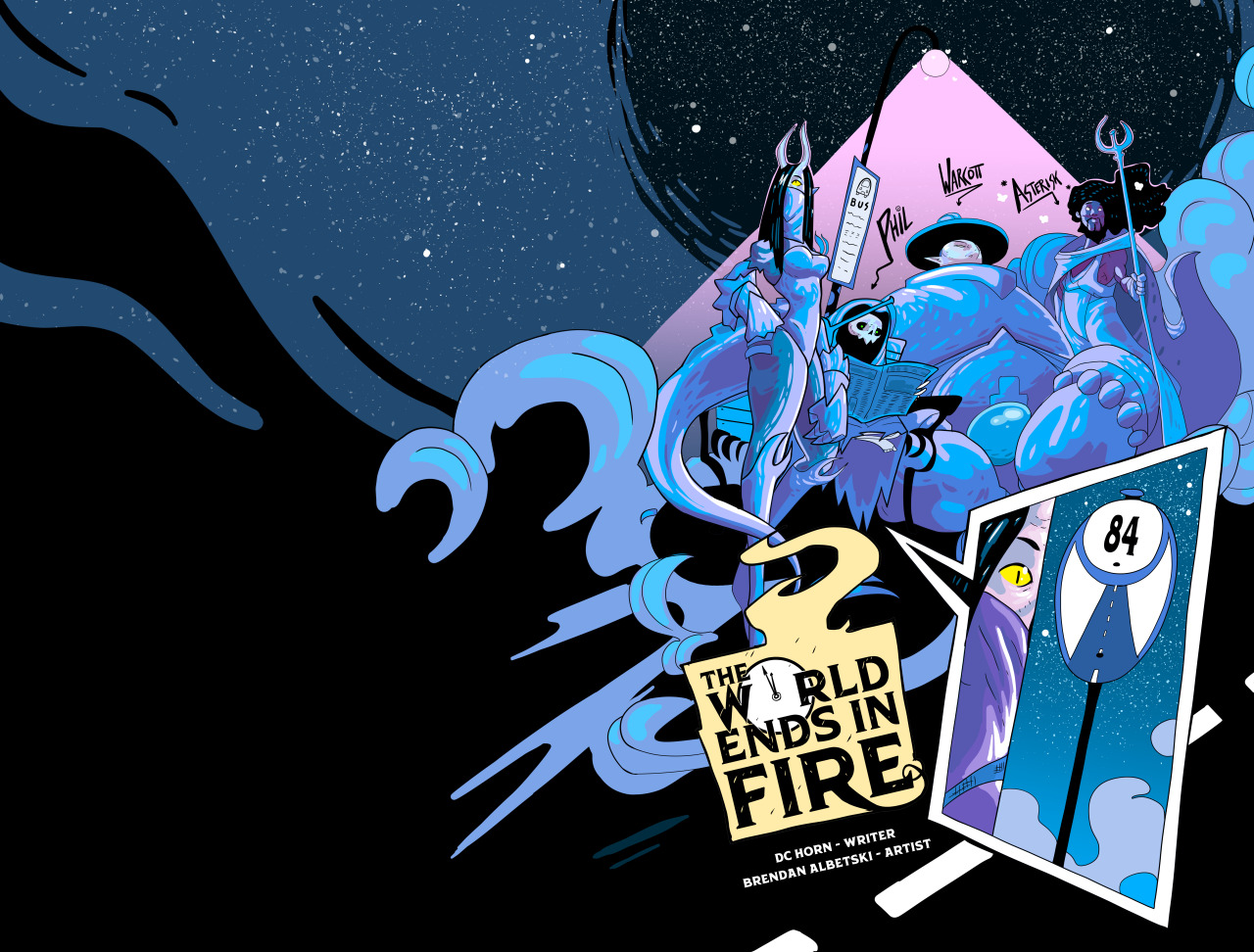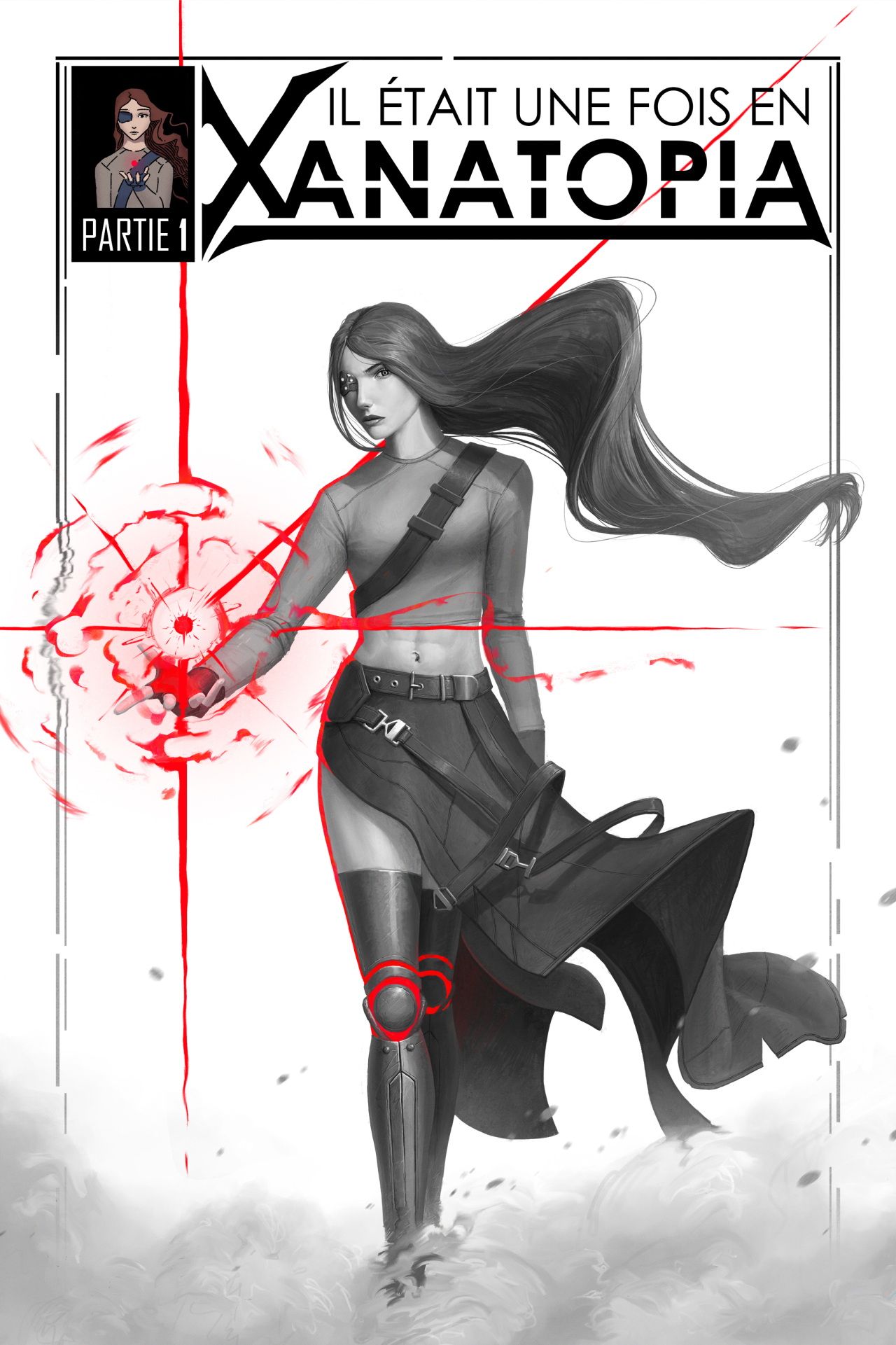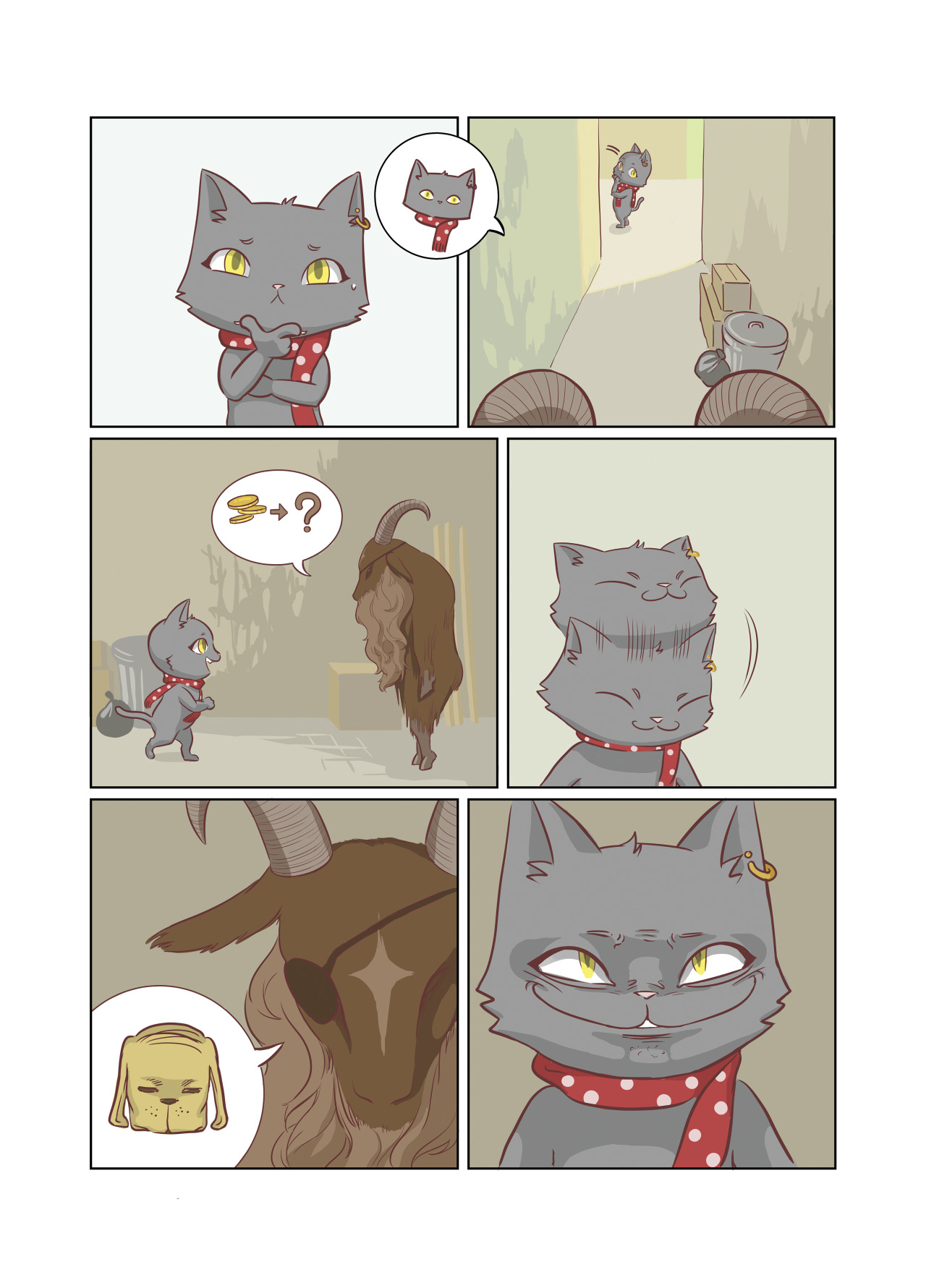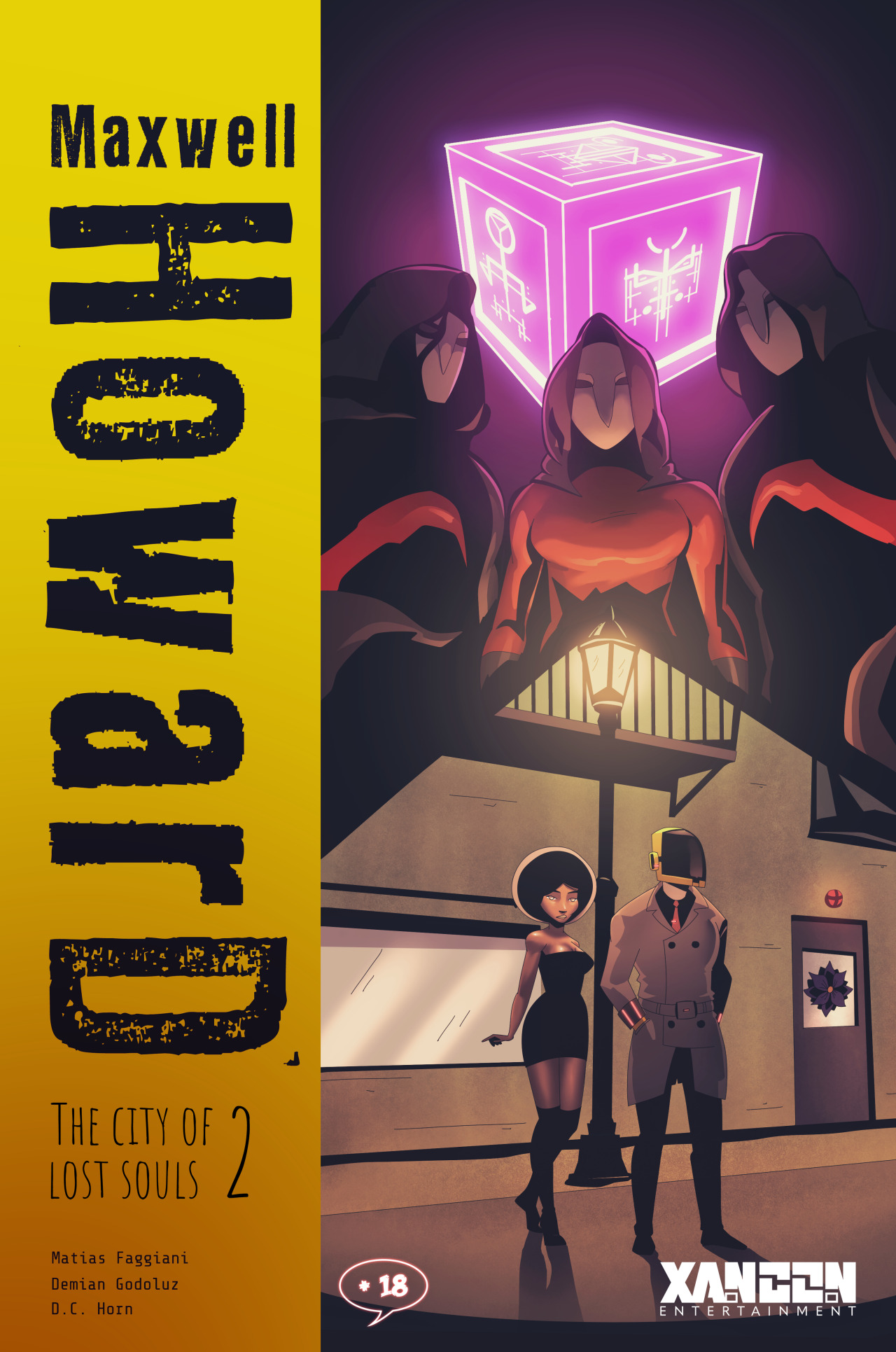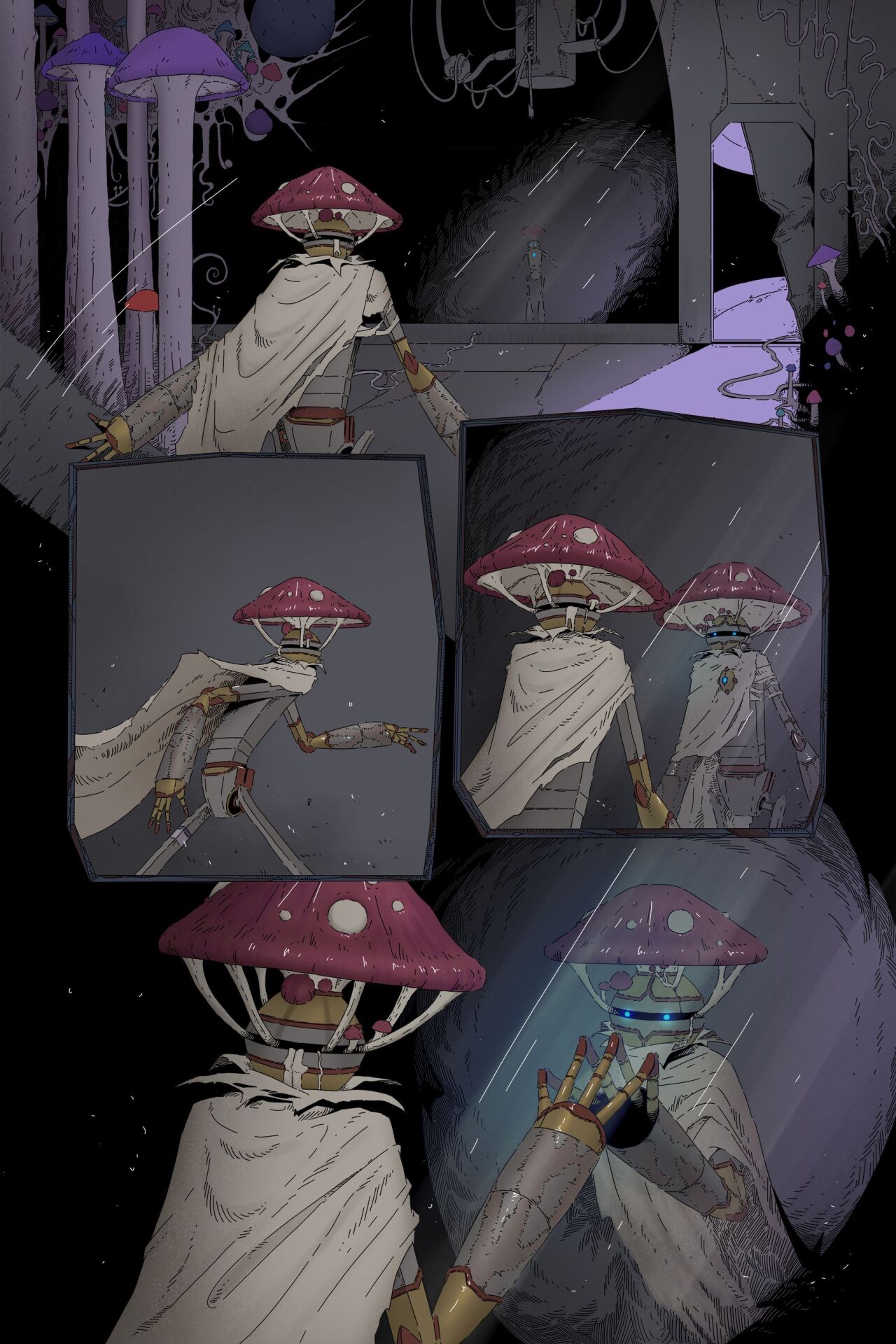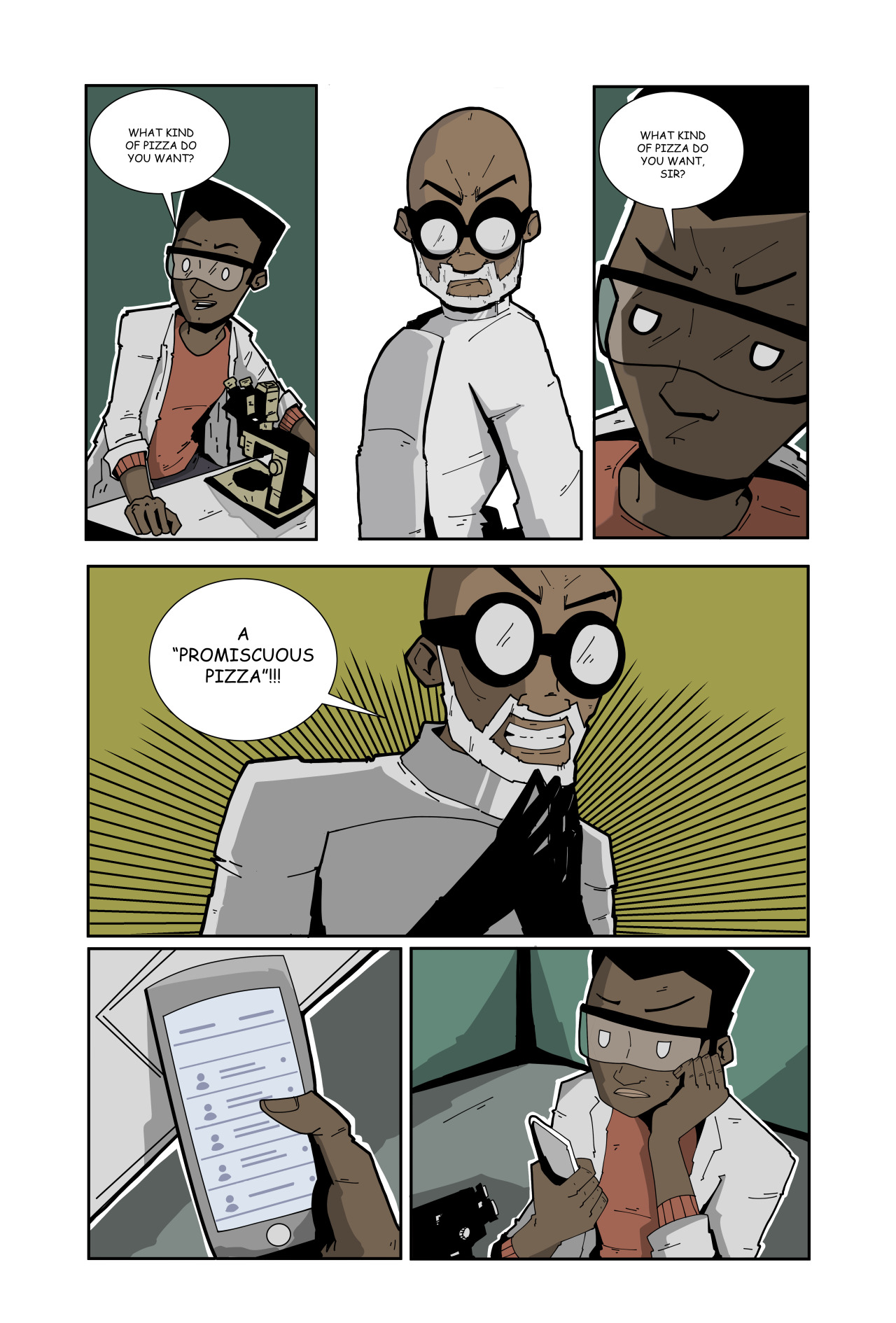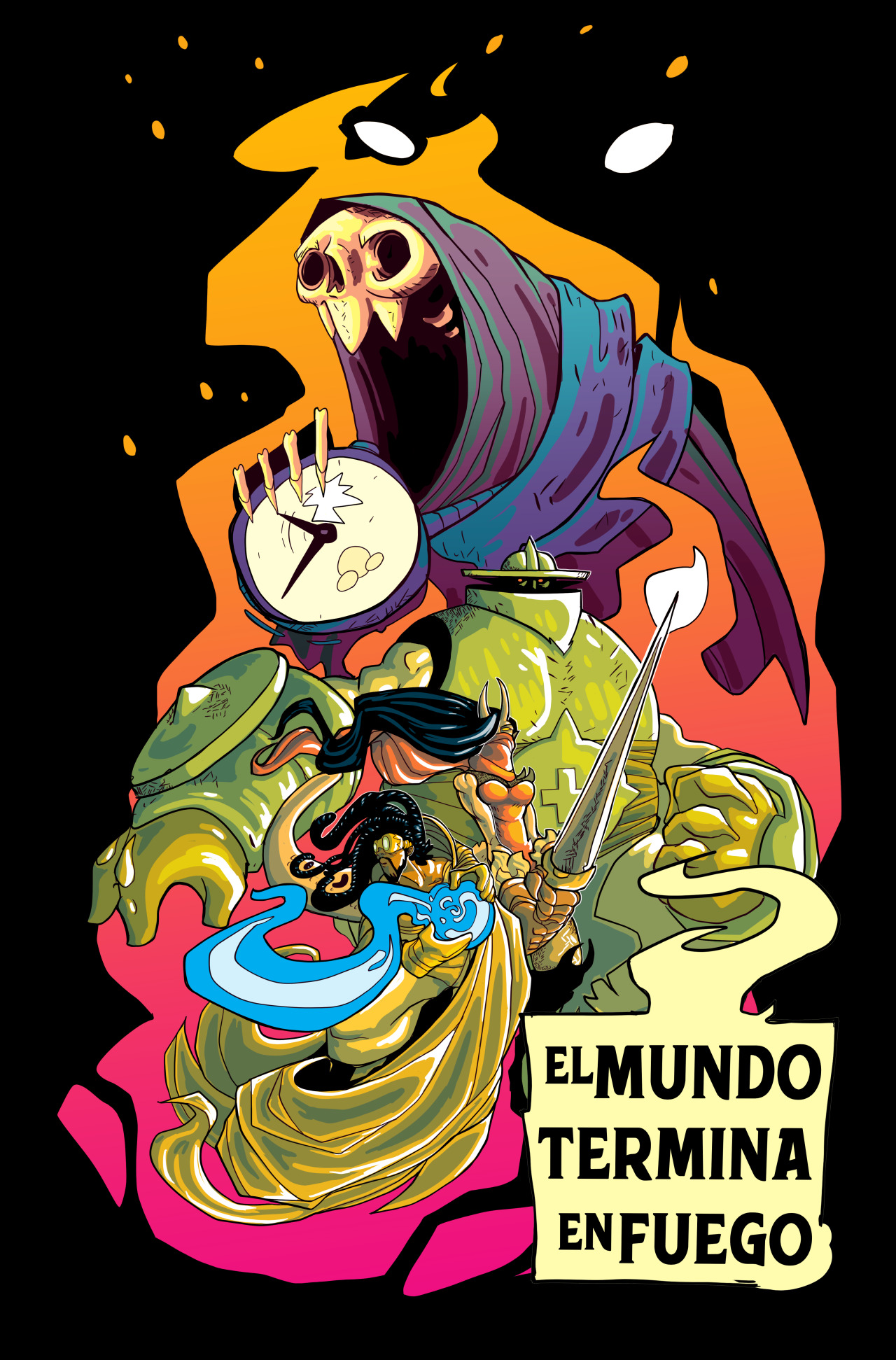Our Creator Interview series returns with an insightful conversation with DC Horn, Editor in Chief and Writer for XanCon Entertainment. With much experience in crowdfunding, and an incredibly varied range of comics in style, themes, and subject matter, this is one interview everyone should read!
GlobalComix: Tell us a little bit about XanCon Entertainment, yourself, and how you got into making comics!
DC Horn: Hello! Thank you for the opportunity to be here. I am DC Horn, “editor-in-chief” and writer for XanCon Entertainment. XanCon Entertainment was named after a dueling card game that I was developing titled “The Xanatopian Conflict.” This card game would be the foundation of our series “Once Upon A Time In Xanatopia.” I wanted to re-skin the cards in the game and hired a few concept artists to help flesh out some ideas. One artist, Miriam Nasseriddine, provided me with a sketch of several characters and scenes. It reminded me of a comic book. I reached out to the artists about shifting the project. I don’t think any of us had done a comic before, but we jumped in headfirst. Many mistakes and a few drafts later we somehow popped out “Once Upon a Time In Xanatopia Volume 1.
But like many people in the indie comic scene, I grew up reading comics. For my whole life I wanted to do something in the medium, but life was always in the way.
I always tell the story about finding my daughters pretending to be YouTubers when they were little. I was watching them play and thinking that it wouldn’t be difficult to create a YouTube channel and do some “Let’s Play” videos for fun. So, for a little while we had a YouTube channel that was really fun to experience. Afterwards I started to internalize the experience and realized that I should do something for myself too. It was an inspiration to try to follow my own dreams, even if at a small level.
GlobalComix: So far, you have an entire collection of stories, often strange, supernatural, or unusual in some way. Is there a universal theme among all of these?
DC: The universal theme is probably that I’m a weird and strange guy haha. Honestly, I don’t think I realized that I enjoyed unusual or bizarre stories until I started making them. I believe that I am attracted to escapism in a way. I don’t want to write about reality or real-world struggles. I don’t want other people to feel how I feel. I would rather share a more fantastic interpretation. Occasionally it seems like reality seeps into our stories though. I can look back at a couple titles and notice similarities. For example, “Rust to Rust” & “Food for Thought” were started around the same time. Both stories are about an existential journey. Both titles dip into nihilism, though in different ways. I can read them now and realize that I was going through some stuff at the time haha. Xanatopia is ultimately about a woman being tasked to kill a god, but the end question of the saga is, “is humanity worth saving?” I laugh sometimes about this ending because… depending on the day, I don’t know what Nora’s answer will be.
I also just love what urban fantasy can allow. In “The World Ends in Fire,” we took several familiar fantasy ideas and mixed them with some modern elements. The first story has a car chase, the second takes place in a classic American diner, the third has the group riding the bus to their destination. The group includes a wizard, a rogue, a fighter/warrior, and a skeleton. I am obsessed with that kind of juxtaposition.
DynastyPOP was a project where I really lean into the strange and unusual. It’s my safe space to get weird.
I love the creative process and just seeing what we can do. Whether it’s an emoji speaking psychotic cat, or a mad scientist that really wants a “Promiscuous Pizza”, or even a little girl with an evil spirit trapped in a balloon.
GlobalComix: Are any of them connected to each other?
DC: DynastyPOP Presents is supposed to be a comic universe to itself. It’s a sandbox project that I long to return to and do some crazy stuff with.
I’ve intended to do more stories in the CAT GOAT DOG universe and expand that series. I wanted to do a story about a doomsday cult of ants that summons an anteater. I really think you can get Lovecraftian with that! Maxwell Howard is a series where my main role is an editor and occasional co-writer. In my heart I believe that it’s tied to the DynastyPOP universe.
GlobalComix: Do you have a favorite project as a group?
DC: Whichever project I am currently working on. I tend to get tunnel vision when I’m in the middle of working on a project. “Rust to Rust” is probably my most honest and heartfelt story. It’s a story that I don’t think I had the courage to say what I really wanted to say, so instead it’s wordless and told visually.
But as far as “group” is concerned… that’s something I really cherish about “Once Upon A Time In Xanatopia.” I’ve gotten to work with so many people on that project either with inside artwork, or variant covers. I’ve had the privilege to have variant covers done by several GlobalComix creators. I look forward to working with even more people on the title as we progress.
GlobalComix: One of the things that’s unique about your work, it’s the availability in a wide array of languages. How are you going about obtaining those?
DC: I remember Chris Nimloth once discussing the GlobalComix vision. He talked about comics for a worldwide audience and explained his unique experiences. He inspired me to commit to the idea. I had already been contemplating translating comics because at the time most of the people I worked with were international. I had already finished CAT GOAT DOG, which flirted with the lines of a universal language. And it was something that I wasn’t seeing in the indie community either. But his story made me commit.
A large chunk of my views on GlobalComix are from other languages. As of writing this “Once Upon A Time In Xanatopia” has over 45K views. A little over 4K of those are in Spanish, around 11K are in French, and about 4K are in Italian. So, of the 45K views… about 20K are non-English. “Maxwell Howard: The City of Lost Souls” is about 4K English to 3K Spanish. Of the almost 30K views on “CAT GOAT DOG” about 3K are in German. It’s pretty obvious that there is a market for indie comics in other languages. I wish I could say the same thing about our printed comics. I think I’ve sold one copy of the Spanish version of “The World Ends in Fire” at a convention LOL.
As far as “how” we are doing those… Some of the people I work with are international, so I’ve asked them to help or ask them for a reference to help with translations. I’ve hired translators on Upwork, and I’ve actually worked with a guy that I met on the GlobalComix commissions page for a Spanish translation. In the grand scheme of comic book making, translating is a reasonably affordable item.
GlobalComix: Has it made a notable difference in the reception of your works overall?
DC: Ooops… I probably answered this with the last question LOL. But yeah, absolutely! I remember someone once talking about how you should look at what other people in your field are not doing. Translating is one of those things. I firmly believe that it is an untapped and overlooked audience that is uniquely potent with GlobalComix. Each week when I read the GlobalComix weekly analytics summary email our readers are mostly non-English.
GlobalComix: One of the staff favorites is CAT GOAT DOG. Can you tell us what the inspiration behind that specific title was?
DC: I’ve never told this story in fear that I would come across as completely insane… but here we go lol. I was in my truck waiting for something or someone. In my boredom, I was pretending to be teaching a class about writing comic books. I asked my fictional class for a mundane prompt. Someone (who doesn’t exist and isn’t real) suggested “a cartoon cat goes to the market.” “Excellent” I answer, commending no one. I instruct the class that while you can write about anything, it must be interesting.
This was a key point I had learned in a real writing class I had taken. I continue my lesson of insanity and suggest that one method of making something interesting is to introduce conflict. So, I ask the fake class, “what could go wrong with the cat going to the market?” Another student comments, “The cat doesn’t have any money.” “Perfect!” I exclaim, trying to inspire this fabricated classroom before asking, “How can the cat solve this problem?” “She can get a job at the market,” someone calls from the back. At this time, I am reviewing the basic outline of a cat going to a market but doesn’t have any money and has to get a job to buy food. At a fundamental level this has all the core ingredients of a story. We can successfully have a beginning, middle, & end. We can tell this story… but… how do we make this REALLY interesting?
I think then that the more wicked part of my subconscious entered the conversation and yells above the class, “the cat can’t get a job and has to kill someone for the money!” And then I smiled… both in the imagined world and the real world. Somewhere along the way I thought it would be ambitious to tell this story with an emoji type language. The story itself was so simple that I felt like I could get away with it. Later that evening I wrote the script in like… 30 minutes and was already looking for an artist.
GlobalComix: Some of your stories are short and pack a punch! Others are longer and more complex. Is there a way that you determine the length of a series when planning it? Or do you let them evolve naturally over its lifetime?
DC: I like to think that as I’ve matured as a comic book writer, I’ve learned to appreciate short stories. I also believe that short stories are more marketable in this TikTok age. A currently unreleased title “Invasive Worlds” aims to test that hypothesis. The first chapter is four pages, the second chapter is six. I think that telling stories in that older, newspaper comic strip style is going to make a comeback.
But also, whenever I can, I like to take comic book writing classes at the Kubert School of Arts. They offer an excellent selection of online comic book making classes, taught by industry professionals, at an affordable price (I really should get commission.) The writing classes have you write an 8-page script. I’ve taken three classes so far and I’ve become familiar with short form comics.
I also love to try new things. The idea of starting a long series right now just feels like a prison sentence to me. I’ve got “Once Upon A Time In Xanatopia” that is an ongoing “forever” saga. We’re a little under halfway through with “The World Ends in Fire,” a project that should be around 15 chapters. But “The World Ends in Fire” is a story that definitely evolved. Originally it was intended to be four issues, then we decided on eight. I remember having a conversation with Brendan Albetski (the artist and partner in crime) about having fallen in love with those characters and how we just can’t end it yet.
I’ve had people at conventions ask about finished stories. They had people talk about having reservation with buying the first issue of a comic that they might never be able to get a second comic for. My answer to that was to experiment in short stories. In contrast to that, at conventions I’ve sold more Xanatopia Volume 1 TPB than single issue comics of the same title. And I’ve sold more issues of “Rust to Rust” (an unfinished graphic novel) than any other comic of ours combined. So, I can’t say that I really know what works.
Being a writer only means that in the comic world you are also a comic book financer. We have to pay someone to complete the project. Short stories are more economically feasible to get completed projects out into the world. In an environment where growing and learning is in doing… short comics is a way to power level.
GlobalComix: As an indie publisher, what do you think the indie space can do to better serve its creators and community at large?
DC: Oh… I wouldn’t presume to know if I’m being honest. When I was first entering the indie space, I was heartbroken at times because I wasn’t getting the attention that I wanted or felt like I deserved. I felt like I was doing a lot to support the community, and that the community wasn’t supporting me back. As I’ve grown as creator, I’ve learned that like everyone else, I can’t support every Kickstarter, I can’t read every indie comic, I can’t watch every podcast and so many of the creators I felt insulted by simply didn’t have the time, just like I don’t. I had a crappy attitude… then I learned and matured to form a better attitude with a more realistic perspective.
I bring that up because I sometimes see larger creators in the indie space use smaller creators’ ignorance as an opportunity to create content. I’ve seen creators make tweets about how wrong somebody is about the comic book making experience. I’ve seen creators do reviews and just trash other people’s comics and their inexperience. I’ve seen creators with 10 thousand followers on twitter use creators with 200 followers as content and I really think that’s wrong. This is a relatively small problem, but it is something in the space I would love to not see anymore. Just a general rule, I think we should encourage publicly and criticize privately.
GlobalComix: What is it doing well already?
DC: So doing a complete 180 after the last question! LOL. There are a lot of creators out there that are giving and nurturing. I think GlobalComix is an example of what a community can be. Having small creators promoted beside large publishers. Doing interviews just like this. There are several great indie comic pod casts out there that are so important to the indie scene.
GlobalComix: What advice would you give to those that are looking to get into crowdfunding?
DC: The number one thing I have to say to inexperienced creators that are interested in diving into the sea of crowdfunding is to watch out for predators. There are a lot of people out there ready to take your money for Kickstarter advice or campaign management. DON’T DO IT! To tie into the last question… there is a great community on twitter, discord, & GlobalComix that are willing to offer advice and thoughts for free. Hell, send me a message and I’ll advise or send you to someone how can.
I’ve had several successful small Kickstarter campaigns, but I don’t believe I’ve really unlocked the secrets of the platform yet. There’s kind of a “which came first, the chicken or the egg” situation of crowdfunding. You need a crowd to fund your project, but you also need a project to build a crowd. One thing I really like about Kickstarter is that it has a built-in audience. There are people on Kickstarter that are looking for indie comics, which you can’t be as optimistic about on some of the other platforms. But sometimes it’s still not enough. If you are fortunate enough to have a project already, GlobalComix and platforms like it are a great crowd building source. One thing that everyone will say about crowdfunding is that “you have to bring the crowd.” That’s an irritating thing to hear when you don’t have a crowd, but it’s true. Start immediately building an audience.
As insufferable as some of the indie comic marketing gurus can be… they are usually right about the fundamentals. So... listen. Also, study successful campaigns.
GlobalComix: Do you have any currently active or upcoming campaigns that readers can get ready for?
DC:We have some schemes coming up soon! I think we’re going to try and do a “Maxwell Howard: The City of Lost Souls” Kickstarter in the next month or two. That is a project that I serve primarily as editor/publisher. The goal for that campaign will be to raise money for the creators that live in Uruguay, my good friends Matias Faggiani & Demian Godoluz.
After that I hope to have “Rust to Rust” complete and do a campaign for that title as a graphic novel. Rust to Rust is our most successful comic in print by a massive margin. There is no close second. I’m really looking forward to having that completed and available for the world. That’s a project that I’ve had the privilege to work with my dear friends David Swanson & Rebecca Fontenot.
GlobalComix: If you could do a dream project, what would it be?
DC: I would love to do something with Doctor Who. For a long time, I’ve joked about wanting to do a Green Lantern story that parallels a western movie. Something like 3:10 to Yuma or High Noon.
I have a literal dream project that I want to start someday. I’m calling it “A Northern Wind” at the moment. It’s a story that came to me over two or three dreams. I would wake up, grab my phone and immediately start texting the dream to myself. It’ll be a short horror story about a widower that is visited by an old flame.
GlobalComix: Do you have any currently active or upcoming campaigns that readers can get ready for?
DC: We have some schemes coming up soon! I think we’re going to try and do a “Maxwell Howard: The City of Lost Souls” Kickstarter in the next month or two. That is a project that I serve primarily as editor/publisher. The goal for that campaign will be to raise money for the creators that live in Uruguay, my good friends Matias Faggiani & Demian Godoluz.
After that I hope to have “Rust to Rust” complete and do a campaign for that title as a graphic novel. Rust to Rust is our most successful comic in print by a massive margin. There is no close second. I’m really looking forward to having that completed and available for the world. That’s a project that I’ve had the privilege to work with my dear friends David Swanson & Rebecca Fontenot.
Thank you so much DC Horn for giving us your time and such thorough answers! It's a great read and full of great advice and stunning artwork.
If you would like to keep up with XanCon Entertainment online, here's a list of links for social media profiles and website:
- Read XanCon Entertainment here
- Follow XanCon Entertainment on GlobalComix here
- Buy Physicals and visit their website here
- Keep up with XanCon Entertainment on Twitter here
